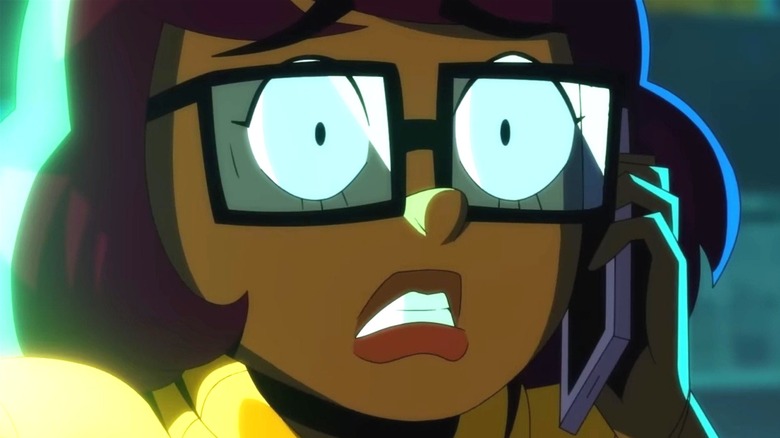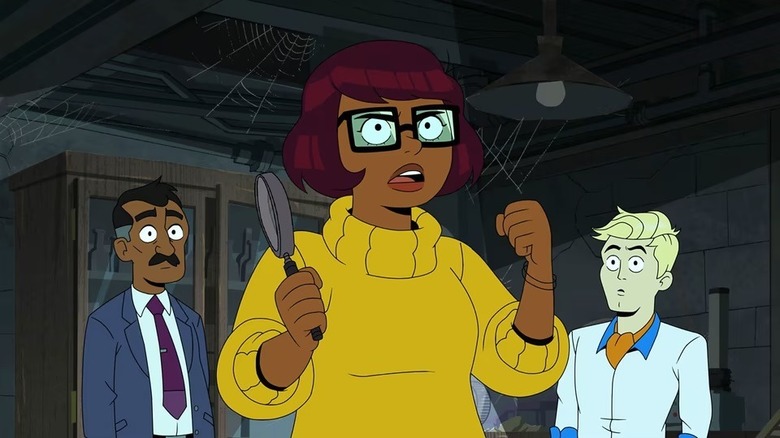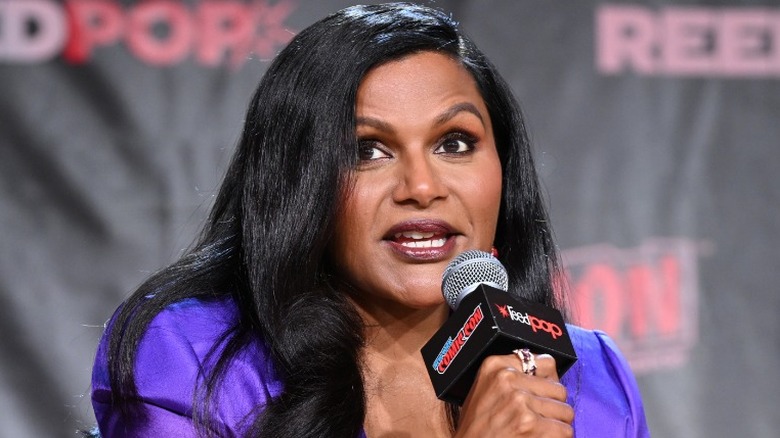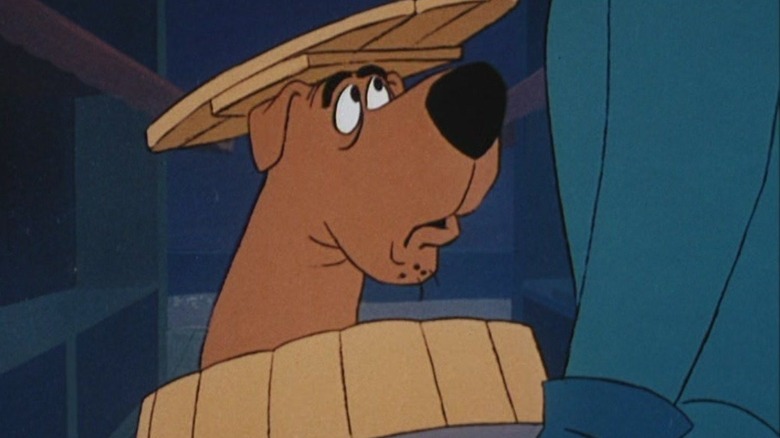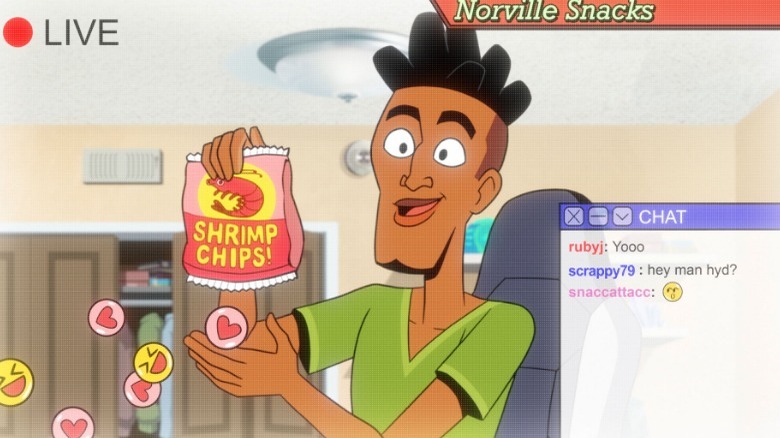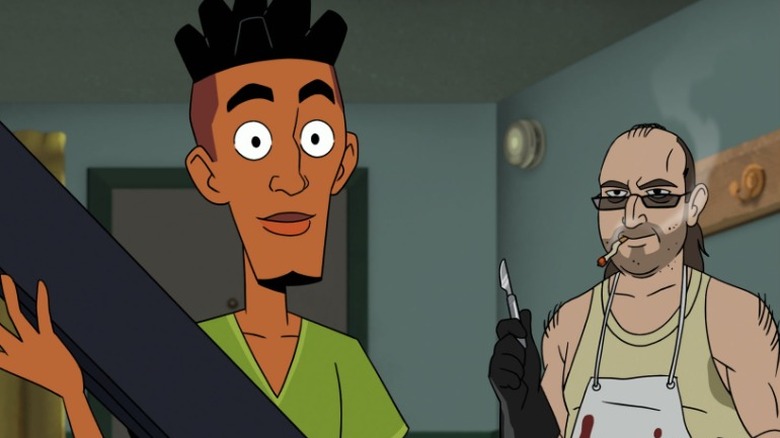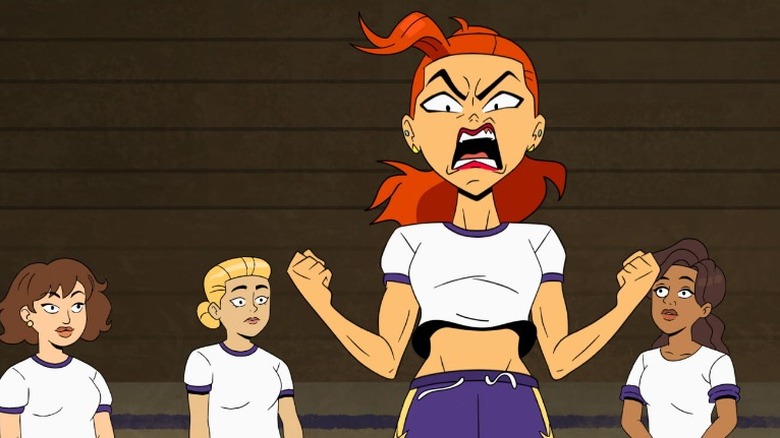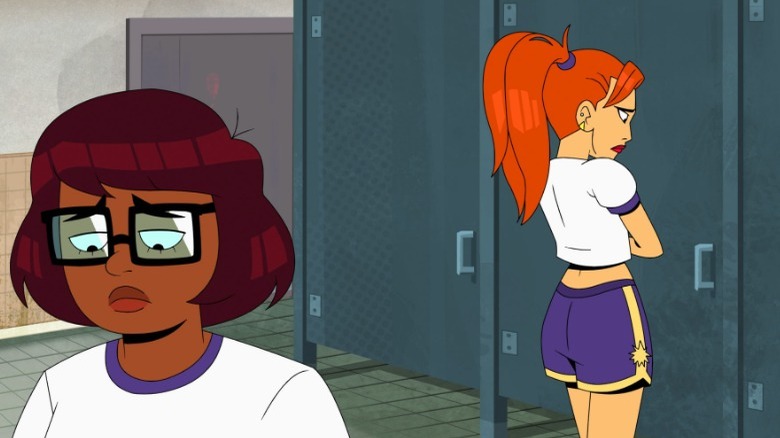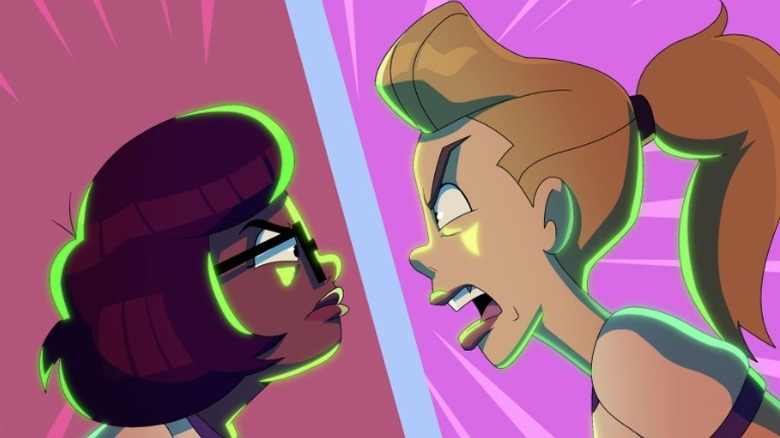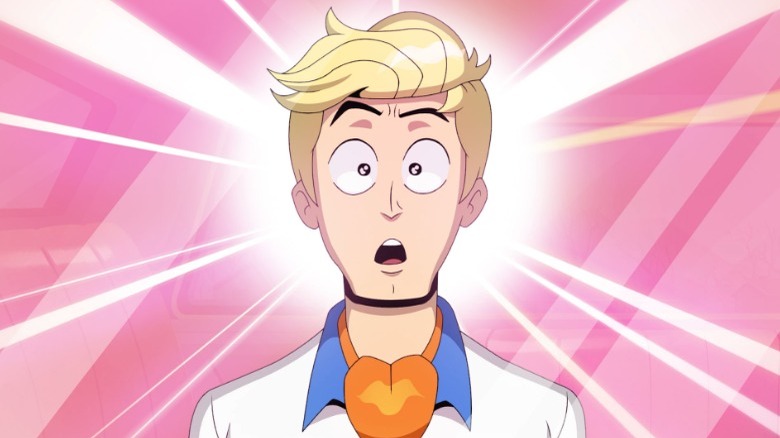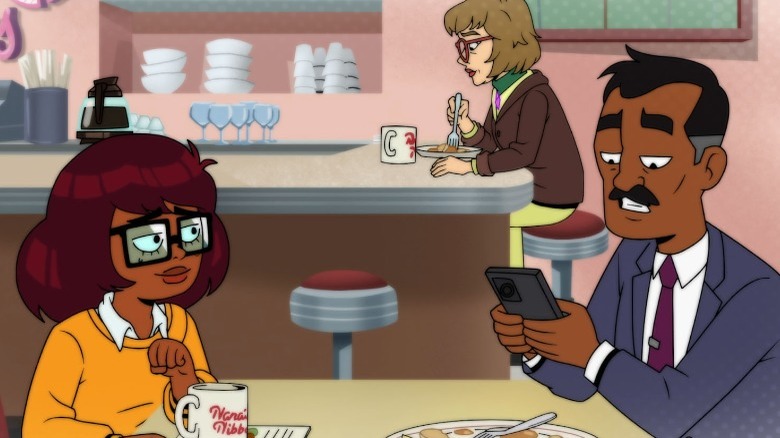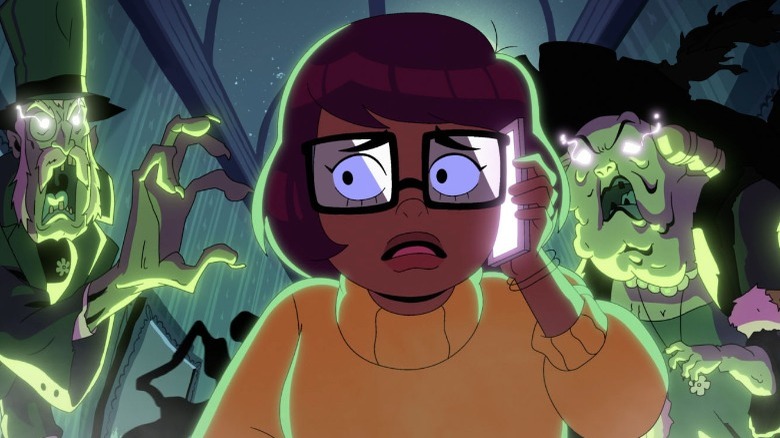The Brutal Backlash Behind HBO Max's Velma Explained
These days, it seems like it's only a matter of time before your favorite old TV show gets a revival with a fresh look and new take, whether it's an '80s sitcom or a classic cartoon. There are plenty of reasons why bringing back old IP can be a solid bet, not least of which is a pre-existing fanbase. From a business perspective, developing existing properties can help mitigate some of the risk associated with a new production, making the new series less of a gamble.
For fans of the "Scooby-Doo" franchise, HBO Max's "Velma" — a prequel about the origins of the Mystery Incorporated gang — probably seemed like a great idea at first. However, when the response to the official "Velma" trailer on YouTube was so scathing that it prompted HBO to turn off the comments, the signs weren't good. Things got even worse when the show's audience ratings tanked on IMDb, Rotten Tomatoes, and Metacritic. Many were left wondering whether it was just another case of review-bombing or if there was actually something more to the backlash. If you've been wondering the same thing, then read on.
We're following the clues to unmask the real truth behind the brutal backlash to HBO Max's "Velma." Spoilers ahead.
The series has received hate from both sides of the political divide
Whenever a franchise with an established fandom gets a new entry, there tends to be plenty of detractors who struggle to accept their beloved characters being completely reimagined. Talking to The Hollywood Reporter, writer and producer Ronald D. Moore recalled the early days of "Star Trek: The Next Generation" when fans of the original "Star Trek" considered the new series to be "second-tier Trek." But, unlike the backlash from other well-established fandoms, the response to "Velma" seems to be uniting many disparate groups of viewers in their dislike.
Typically, re-imagined shows catch a lot of hate because of their divergence from the source material. However, "Velma" has taken flack for a variety of reasons. Slate cited the show's adherence to the cash grab streamer formula of "rebooting major IP, darkening the tone of a beloved children's franchise, [and] attempting the 'wokeification' of older franchises." It also argues that "Velma" fails to achieve the balance of more successful variants, like Netflix's "Wednesday."
Predictably, groups like the fundamentalist Christian group One Million Moms railed against the series. However, for every critic and audience member that blasted the show as "too woke," another spoke up to claim the show is openly mocking wokeness. Forbes even reported on a theory that Mindy Kaling (the voice of Velma and an executive producer) created the show to parody progressives, though the writer of the piece didn't buy into it. "I'm not sure I subscribe to this 'Mindy Kaling made a dogwhistle series for right wing trolls' theory, as the Occam's Razor explanation is that the show is just... bad," said senior contributor Paul Tassi.
Mindy Kaling already had a controversial reputation
While the theory that Mindy Kaling created "Velma" as a way to subtly mock the left and arm the right is far-fetched to say the least, some have pointed to past controversies involving the comedian as proof that she's not as progressive as many of her peers in Hollywood. Kaling's memoir "Is Everyone Hanging Out Without Me?" was deemed offensive and insensitive by some reviewers. "I was NOT laughing when Kaling used transphobic language," said The Feminist Lens.
Viewers have claimed that Kaling's comedic repertoire often makes light of negative South Asian stereotypes, mocks South Asian culture, and features a South Asian protagonist with an extreme attraction to white men — and that "Velma" is no different. Others have flat-out accused Kaling of hating her heritage. "I'm happy Mindy Kaling's style of writing brown girls that hate themselves wasn't around when I was younger & only became a thing when I was at the age where I loved my heritage and skin color," Women's Republic founder Sai Seshadri tweeted two days after "Velma" premiered.
As The Wrap observed, Kaling's character on "The Mindy Project" was exclusively paired with white men, a complaint the writer dismissed while speaking with Entertainment Weekly. She said: "Do people really wonder on other shows if female leads are dating multicultural people? Like I owe it to every race and minority and beleaguered person." Kaling has also drawn criticism for a clip of her joking to Conan O'Brian about threatening her staff when they called her out for spontaneously kissing Lee Pace on set. "Mindy Kaling openly bragging about sexually harassing co-workers and using her position to threaten people with their jobs," one YouTube user said in the comments section. "That's messed up."
Scooby-Doo is notably absent
Although "Velma" features a few central characters from the "Scooby-Doo" franchise, it's hard not to notice the very prominent absence of the linguistically gifted Great Dane himself, an absence that many fans of the franchise find hard to swallow. Speaking to TV Insider, Kaling expressed her and showrunner Charlie Grandy's mutual love for the original "Scooby-Doo," as well as their gratitude for Warner Bros. allowing them to "modernize certain elements" of the property. According to Grandy (who Kaling met when he was writing for "The Office"), Kaling approached him about developing an origin story for the Mystery Inc. gang, something he jumped at. However, while Warner Bros. were okay with her developing "Velma," the studio's blessing came with a caveat — no dogs allowed.
Grandy addressed the canine's absence during a New York Comic Con panel (per Insider), explaining that Warner Bros. explicitly refused to grant HBO the rights to use Scooby-Doo for the series. To Grandy, this was an acceptable loss, since he and Kaling intended the series to be an adult animation anyway. "We couldn't get a take on it that was like, 'How do we kind of do this in a fun, modern way?'" Grandy said. "[We] felt like what made it a kid show was Scooby-Doo." By going into the gang's life before they met the franchise's titular pooch, they were able to solve the canine conundrum. However, for the fans — many of whom feel that Scoob is the heart and soul of the sleuth circle — the doggo's absence is hard to overlook.
The show has been accused of racism
In a world where whitewashing has been the standard for far too long, changing the race of a character — or racebending, as it's often referred to — is a way to broaden minority representation on the screen. When done well, these changes allow for an insightful reimagining of a character, but does "Velma" get it right? On the surface, it seems like "Velma" takes a positive step in changing the races of three main characters. Besides reimaging its titular character as an American of South Asian descent, the show changes Daphne to Asian and has Shaggy — who goes by his actual name, Norville — as Black. However, the response to this went down poorly on both sides of the political divide.
Right wing comic Leo Kearse called the show "openly racist against white people" in an article for the Scottish Daily Telegraph, pointing to the fact that Fred "seems to always be the butt of the joke." Yet, many people who are in favor of more diversity were also disappointed and called the show out for being racist in its new depictions of Velma, Daphne, and Shaggy. "It's been a joke that Shaggy's a stoner for the past couple of decades," Redditor TheJokerArkhamKing said. "They took the stoner, cast a Black actor, and redesigned him to be Black. Daphne has been consistently depicted as a rich socialite. Making her a rich Asian is just another stereotype." The post goes on to lament the fact that the creators made Velma, a South Asian character, a whiz with computers, dubbing the show "a smorgasbord of stereotypes."
Another Redditor, Th3G0ldStandard, said that the creators got it horribly wrong. "I want more representation," they wrote. "But when it is done this way, it just shows they are pandering without any substance."
Some viewers think it relies too heavily on shock value
"Velma" leaves no doubt about who its intended audience is in the opening episode, which is full of raunchy content. It packs a surprising amount of sex, violence, and drug references into a half-hour cartoon. While fans of Scooby and Shaggy have long joked about the pair's apparent cannabis use, "Velma" sees Daphne turned into a drug dealer nicknamed the Candy Woman, even enlisting her old pal Velma to help out with her final sale.
On top of that, in an era where school violence continues to plague the United States, the series features a lot of graphic violence for a show about high school kids, beginning with Velma's crowbar attack on a showering Daphne in the pilot episode. The show doesn't shy away from gory depictions of crime and even includes a plot that sees Norville attempting to sell one of his kidneys to win Velma's affection.
While many viewers found the more mature take on the Scoobyverse unobjectionable, some complained that the show was way too reliant on shock value. "It's taken too many auspicious liberties with its TV-MA rating to be unnecessarily crass and crude (The Baby Bump photo op scene, I still cannot scrub the disgust and horror from my eyes)," Redditor ThatstheTweest said. "It's being raunchy for the sake of being raunchy, which makes it pointless."
The characters are generally unlikable
Part of what makes "Scooby-Doo" so endearing are the lovable characters and their chemistry. Although each of the main characters superficially fits a stereotype, their personalities are all pretty likable and come together perfectly in a way that lets them all be more than their label. Like all good friend groups, they're simply better together. While every incarnation of the gang tweaks their personalities slightly, each iteration somehow manages to maintain the same core chemistry and charm — that is, many fans assert, until "Velma" came along.
Many viewers simply don't like the show's incessantly cynical lead character Velma, who spends most of her time dragging her classmates and anyone else with the misfortune to cross her path. Within the first five minutes of the pilot, she's physically attacked an unarmed Daphne, calling her a "b****" and "stupid" before dissing Daphne's "fake-a** friends." When she becomes a person of interest in Brenda's murder, her dad reminds her she was voted "most revenge-y."
While OG Fred was a likable fellow with a borderline obsessive love of traps, "Velma" Fred is a narcissistic, barely functional rich kid who can't remember Velma from one interaction to the next. And then there's Daphne, the ultimate Mean Girl who calls Velma "Vermin" and demands $500 in exchange for Velma's mom's cold case file. Norville is arguably the most likable among the four, but the fact that he spends most of his time pining for Velma is a bitter pill for OG Shaggy fans.
The show has been accused of queerbaiting
As a character, Velma has long been seen as a lesbian icon. As Alani Vargas noted in "The Gay History of Velma" (via The Daily Beast), Velma has been queer-coded since Mystery Inc. first emerged in 1969. Many people involved with various new takes on the character hinted at it over the years, and Velma's sexuality finally became canon in the 2022 film "Trick or Treat Scooby-Doo!" To many fans, the idea that Velma would be gay in her latest iteration seems to naturally follow her long history of queerness. And yet, many feel that "Velma" failed in its representation of the beloved character's identity, engaging in what is often referred to as queerbaiting — hinting at a queer relationship developing but not seeing it through.
At the show's outset, Velma is obsessed not with Daphne but Fred, which may seem an odd choice for the brainy gal. While it makes sense that this early Velma would be in the process of exploring her sexuality, her quick shift from crushing on Fred to getting red-faced over Daphne after the two share a kiss seems performative and unearned to some viewers, given the fact that they start out as enemies. "I'm down if they're bisexual," Lyra Hale of Fangirlish said before adding that the uneven storytelling leaves viewers with "a set of relationships that feel disingenuous from the start."
There's a joke about the #MeToo movement
Of all the controversial things about "Velma," the biggest of the bunch has to be the joke that pokes fun at the #MeToo movement. In the episode "The Candy (Wo)Man," Velma tells Daphne: "I spit the truth without a filter, like every comedian before #MeToo." It was the Mindy Kaling mic drop heard around the world — or, at least, all over Twitter. Reactions came pouring in, many of them angry, others confused. "The fact that Velma goes from weird transphobic jokes in the same episode mocking how comedy shifted after 'MeToo' to 'woah guys! Diversity win!!' Has officially made this the first ever show without a demographic to appeal to," user @somari8591 tweeted.
As Kimberly Terasaki of The Mary Sue put it, the line "seems designed almost entirely for shock value, with almost no self-awareness or acknowledgment of how out there it is." It's a joke that looks even worse when juxtaposed against a throwaway line from Episode 1, in which one of Daphne's cop moms tells Velma, "You were lurking around the showers like a gym teacher who isn't a gym teacher anymore." Although the argument could be made that Velma's take on #MeToo is just another example of her need for growth, going down this route is not a good look for the show.
Some fans feel the show sexualizes teenagers
One of the show's early scenes takes place in the girls' locker room of Crystal Cove High, where a group of bare-bottomed girls are hashing out the "team shower discussion topic of the day," assigned to them by Daphne. "Have you ever noticed how pilot episodes of TV shows always have more gratuitous sex and nudity than the rest of the series?" the shower-capped Daphne asks, launching a discussion that quickly devolves into a fully nude cat fight with carefully-placed bubbles. "I'm not a prude or something," Twitter user @gcramer30 said. "I'm not closed minded. But maybe something called Velma as in Scooby Doo, shouldn't start with a girls locker shower scene. my older son found it and I said put it on. For my kids. Like cool updated Scooby Doo. Ah the modern era."
The troubling objectification doesn't end with the girls. One of the recurring bits in the series pertains to Fred's status as a "late bloomer" whose hairless legs and delicate features are an embarrassment to his father. During a later conversation between Velma and her lawyer dad, Velma tells her father she is convinced of Fred's guilt because "Fred's a rich white guy with a tiny dong." To some viewers, making light of a teenage boy's sexual maturity is in poor taste at best and, at worst, borderline predatory. "Velma went from being intelligent to a smart-ass," @MelixxaLiIIy tweeted, taking issue with the main character "bodyshaming Fred with jokes about 'micro-penis' just because he's under developed." They added: "Let's not forget that we're shaming a 15 year old."
The jokes rely heavily on meta commentary
It's almost hard to believe that fourth wall breaking was once rare. This type of self-referential or "meta" humor served as a device for examining or even subverting a genre's use of tropes and was integral to the comedy writing of shows like "Arrested Development" and "Community." Unfortunately, the trope has seen a rise in usage that veers into cliché territory, showing up in everything from children's films to laugh track sitcoms. Increasingly, audiences are reporting a kind of meta fatigue as they tire of the oft-formulaic insertion of referential jokes that add little to the writing. And perhaps because it's such an easy formula to write, "Velma" makes abundant use of this joke writing strategy, much to the chagrin of some viewers.
The relentless meta humor begins moments into the series when Velma ruminates on origin stories and continues through the first scene with Daphne's proclamation that "pilot episodes of a TV series always have gratuitous sex and nudity." As Steve Reviews lamented, "You can't go more than two minutes without the show trying to show off how clever and self-aware it is." From lines like "what would happen if this was a show" to explicit discussions of the TV trope the animation is currently referencing, there's a lot of meta humor. Although Cracked reminds detractors that "Scooby-Doo" has always been meta and reviews from the likes of Collider found this writing subversively hilarious, many feel meta humor is best when used sparingly.
Many viewers have praised the art but feel it is wasted
Despite the show's poor reception, many viewers have praised the animators responsible for "Velma." As an adult animated series, it's to be expected that the show would redesign the Mystery Machine universe. The show's stylistic appearance may feel familiar to fans of other contemporary adult animations, like HBO's "Harley Quinn," for example.
There's no denying that "Velma" is a treat to look at, with fans praising the art despite the show's other shortcomings. Reviewers like Saberspark noted the show's interesting redesign of iconic characters, observing the animators' attentive focus on giving each character a "distinct and polished look." And, although there aren't nearly enough of them, "Velma" also contains beautifully-rendered depictions of the titular character hallucinating dark psychedelic visions as she veers into mystery-solving territory. However, aside from these trippy scenes, most of the animation surrounds some pretty straightforward storytelling that doesn't allow much room for creative license.
Some viewers also observed that the writing and animation teams struggle to sync up their intentions. As Quinton Reviews noted, the animators incorporate pop culture references that aren't supported by the acting or storytelling, tweeting: "The main cop in the show is visually based on Don Knotts, a famous guest in the og show... but his voice isn't?" While it's clear the animators understood their source material, these gaps in storytelling have caused many to question the authenticity of the showrunners' relationship to the IP.
